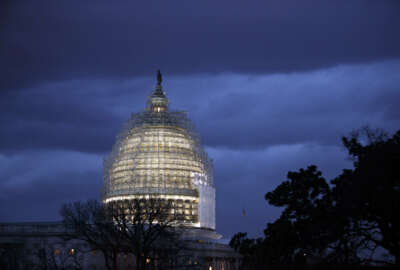Support for a governmentwide investigation of federal employees’ use of official time is gaining momentum in Congress.
In a slew of letters addressed to 26 agency leaders, House Oversight and Government Reform Chairman Jason Chaffetz (R-Utah) and Subcommittee on Governmental Operations Chairman Mark Meadows (R-N.C.) want to know how many government employees carry out official time functions during the workday.
More specifically, the oversight officials want to know the names, titles and salaries of every federal employee who uses official time. They also want to know whether these employees work on union matters on a full-time basis.
“Federal employees who perform a representational function on behalf of a labor union are granted ‘official time’ for those activities during work hours, even when those activities are unrelated to their federal function. In some cases, federal employees perform official time functions on a full-time basis,” the letter said.
Rep. Jody Hice (R-Ga.), another member of the House Oversight committee, also drafted the letter. In March 2015, Hice introduced the House version of Sen. Johnny Isakson’s (R-Ga) official time-killing bill.
The letter blast comes just a few weeks after Rep. Dennis Ross (R-Fla.) introduced a bill that would require the Office of Personnel Management to submit an annual report to Congress that details the reasons federal employees were granted official time.
OPM and the Government Accountability Office last issued reports on official time in 2014.
“Official time is the product of the unique and voluntary nature of collective bargaining in the federal government. It allows unions to fulfill their duty of fair representation to members and non-members alike,” House Oversight ranking member Elijah Cummings (D-Md.) said on Feb. 16 in a statement to Federal News Radio.
Cummings’ office said OPM plans to issue another report this year on the use of official time in fiscal 2014.
Official time, which is paid time off for workers to represent their union, has long been a point of contention between members of Congress and federal employee unions.
“Official time represents a tiny fraction compared to the federal payroll, but it makes labor-management relations more efficient and productive and improves the government’s services to the public,” National Treasury Employees Union President Tony Reardon said Feb. 16 in an email to Federal News Radio. “Established under the 1978 Civil Service Reform Act, official time is subject to negotiation, is approved by management, and is used, for instance, when union representatives and managers participate in work groups to identify cost savings or implement new workplace initiatives to better serve taxpayers. Official time cannot be used for internal union activities or for any political purpose.”
The American Federation of Government Employees, the largest federal workers union, recently defended the practice of official against the measures in the Ross bill.
“There is no union business conducted on official time,” AFGE President J. David Cox said Feb. 5 in an email to Federal News Radio. “Current law mandates that, prior to any use of official time, agency management and the labor organization representing agency employees come to an agreement on how and when the use of official time is reasonable, necessary and in the public interest.”
Likewise, National Federation of Federal Employees President William R. Dougan said official time ends up saving the government money.
“Whether the savings arise from administrative adjudications as a way to avoid costly attorney fees or from a local military installation collaboratively reforming its work systems to save taxpayers millions, official time is at the heart of effective government operations. Official time is efficient time,” Dougan said Feb. 5 in a statement to Federal News Radio.
Copyright
© 2024 Federal News Network. All rights reserved. This website is not intended for users located within the European Economic Area.
